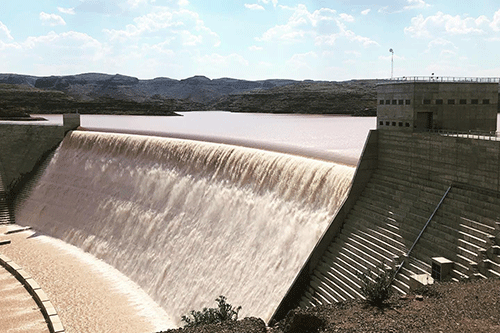KEETMANSHOOP – Agriculture, Water and Land Reform Minister, Calle Schlettwein, said it is imperative for stakeholders to first agree on an economically viable model and its operationalisation for a Neckartal Dam irrigation project.
The minister emphasised that only after these matters have been agreed upon that infrastructure can be planned and constructed for the dam irrigation’s potential to become a reality.
Schlettwein last Thursday advised traditional leaders, politicians, farmers, technocrats and members of the public during a stakeholder meeting by explaining how to optimally use the bulk water supply available at Namibia’s largest dam.
Elaborating on the irrigation scheme proposals, the minister said one of three models should be identified as most suitable for the project. “We should consider either one of the existing green scheme models; one operated by large agricultural farming operators only or an alternative a model operated by medium and small agricultural farming operators,” he explained.
Schlettwein continued that the preferred model should be a bankable one, meaning the owners and operators should be able to financially gain through the sale of their commodities.
“You should be careful not to let envisaged secondary planned projects like tourism, fishing and electricity generation influence the primary objective of agricultural farming, but rather harmoniously blend all these projects,” he advised.
In terms of the division of the 5 000ha of land identified for irrigation, the minister proposed it should either be one large green scheme model, be divided into five standard green scheme models of a standard 1 000ha each, or be managed by a combination of large, medium and small-scale agricultural operators as one farm.
“In terms of the last option, the large operators should support the medium and smaller ones with inputs such as fuel, fodder and seeds, to mention but just a few,” said Schlettwein.
He added that the anticipated irrigation project should address the pressing issue of food self-sufficiency and economic growth whereby the bulk water supply should be exploited for the benefit of the citizens in the //Kharas region and the country as a whole.
“You as direct beneficiaries should thus take ownership of the project as you can only succeed with what you own,” the minister urged those present.
Schlettwein also explained that at the time when the project has been conceived, investment capital was readily available in a favourable economic climate. However, with the current status of the world economy, this has become a challenge.
“The two phases (construction of the dam and the irrigation project) were planned to be financed with budgeted State resources, but after the first phase, government was stopped in its tracks as we ran out of money.”
The minister continued that plans for the irrigation project were delayed due to increased costs of the dam’s construction tender coupled with increased difficulty in raising funds.
“We now have to source the N$2 billion needed for the project from foreign investors through bilateral/trilateral agreements or private investors,” he said. He, however, believes that a lack of financial resources should not stop the project.
It also transpired during last week’s meeting that government, apart from the 5 000ha of irrigation land already available, also purchased an additional 12 000ha of land at a cost of N$18 million for irrigation and resettlement purposes.
The Neckartal Dam has a full capacity of 800 million cubic metres of water and is three times the size of the Hardap Dam. Neckartal is so massive that concrete used during construction can build a one metre high concrete wall stretching from Cape Town to Windhoek.



